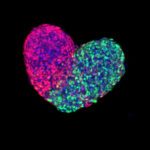Link to Pubmed [PMID] – 37890488
Link to HAL – pasteur-04265968
Link to DOI – 10.1016/j.devcel.2023.10.001
Developmental Cell, In press, ⟨10.1016/j.devcel.2023.10.001⟩
Transcription factor combinations play a key role in shaping cellular identity. However, the precise relationship between specific combinations and downstream effects remains elusive. Here, we investigate this relationship within the context of the Drosophila eve locus, which is controlled by gap genes. We measure spatiotemporal levels of four gap genes in heterozygous and homozygous gap mutant embryos and correlate them with the striped eve activity pattern. Although changes in gap gene expression extend beyond the manipulated gene, the spatial patterns of Eve expression closely mirror canonical activation levels in wild type. Interestingly, some combinations deviate from the wild-type repertoire but still drive eve activation. Although in homozygous mutants some Eve stripes exhibit partial penetrance, stripes consistently emerge at reproducible positions, even with varying gap gene levels. Our findings suggest a robust molecular canalization of cell fates in gap mutants and provide insights into the regulatory constraints governing multi-enhancer gene loci.


